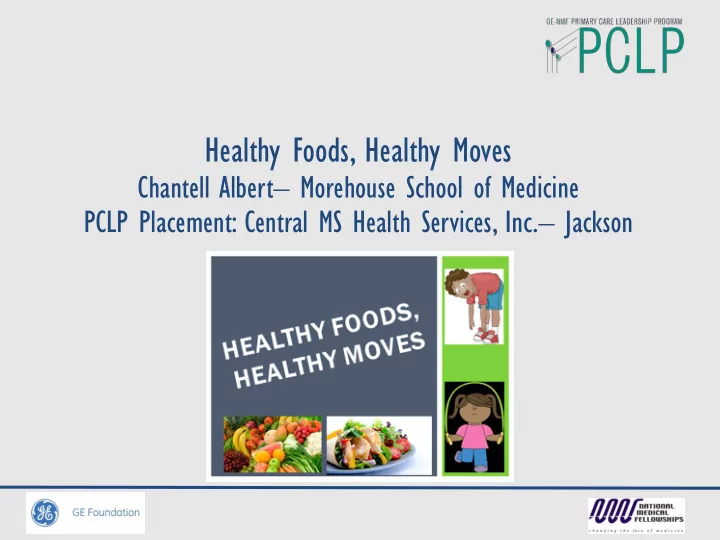

Healthy Foods, Healthy Moves Chantell Albert – Morehouse School of Medicine PCLP Placement: Central MS Health Services, Inc. – Jackson
Introduction Personal interest in primary care, pediatrics, nutrition & wellness Overview Background, Methods, Results, Discussion, Recommendations An interactive workshop designed to encourage children to improve overall wellness by adopting healthy, sustainable habits. Also, a pilot investigation of the effectiveness of interactive workshop as a means of patient education
Background/Literature MS rank for overweight and obese children (1 being the best) is 51 The prevalence of overweight and obese children in MS has increased Obesity Increased risk of developing diabetes, heart disease and stroke AAFP reports that, “very small changes can improve your health considerably”
Methodology Pretest & Posttest 8 questions targeting current knowledge Topics: body mass index, comprehending nutrition labels The same 8 questions were given following the workshop
Results: Question by Question 4.5 4 3.5 Number of Correct Reponses 3 2.5 2 1.5 1 0.5 0 Question 3 Question 4 Question 6 Question 8 Question Number # of correct responses pretest # of correct responses postest
Discussion • Overall, improved knowledge surrounding reading nutrition labels and body mass index • Questions raised: • Long term information? • Will habits actually change? • Is a workshop sustainable? • 5 patients, representative? • Further research required • What is the most effective means to get patients to adopt healthy habits?
Recommendations • Interactive workshops are a good way to present information to a body of patients all at once • Biannual workshops for pediatric and/or adult patients • Incentives to increase attendance • Workshops/General education in wait rooms • Interactive videos during waits in wait rooms • Help patients set goals at the end of appointments & follow-up on these goals at subsequent visits • Goal logs (i.e. weight, blood pressure, etc.)
Conclusions Early intervention is necessary Children and adolescents who are obese are likely to be obese as adults . Important health implications Small changes make a difference Healthy habits, can lower the risk of becoming obese and developing related diseases. Family & society plays a role The diet and activity behaviors of children are influenced by society. Nationwide issue that begins in the community There are opportunities for children to learn and practice healthy eating and physical activity.
Acknowledgements Central Mississippi Health Services, Inc. staff & faculty Special Thanks: Dr. Bacon Ms. Moore Ms. Ivory Mr. Harrion Mr. Gregory The kids!
Sources • Adolescent and school health. (2014, February 27). Centers for Disease Control and Prevention . Retrieved July 15, 2014, from http://www.cdc.gov/healthyyouth/obesity/facts.htm • Candy, S. (2013, March 1). Small Changes, Big Health Payoff. American Association of Retired Persons. Retrieved June 15, 2014, from http://www.aarp.org/health/healthy- living/info-02-2013/small-changes-big-health-payoffs.html#slide8 • National Heart, Lung & Blood Institute. (2011, November 3). What Is Metabolic Syndrome?. - NHLBI, NIH . Retrieved May 31, 2014, from http://www.nhlbi.nih.gov/health/health-topics/topics/ms/ • National Initiative for Children’s Healthcare Quality. (2007, January 1). Mississippi State Fact Sheet. Retrieved June 25, 2014, from http://www.childhealthdata.org/docs/nsch- docs/mississippi-pdf.pdf • Staff. (2010, December 1). Nutrition: Tips for Improving Your Health. American Academy of Family Physicians . Retrieved June 15, 2014, from http://familydoctor.org/familydoctor/en/prevention-wellness/food-nutrition/healthy-food- choices/nutrition-tips-for-improving-your-health.html • United Health Foundation. (2014, January 1). America's Health Rankings . Retrieved May 31, 2014, from http://www.americashealthrankings.org/MS
Recommend
More recommend